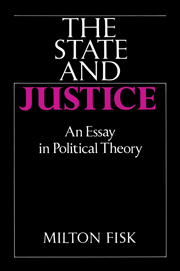Book contents
- Frontmatter
- Contents
- Preface
- Introduction: Can the state rule without justice?
- Part One An outline of a materialist political theory
- Part Two An assessment of the place of justice in the state
- Part Three A functional view of political institutions
- Part Four An account of the community of states
- Part Five A reflection on the transition to a new kind of state
- Conclusion: State, class, and democracy
- Notes
- Index
Introduction: Can the state rule without justice?
Published online by Cambridge University Press: 06 July 2010
- Frontmatter
- Contents
- Preface
- Introduction: Can the state rule without justice?
- Part One An outline of a materialist political theory
- Part Two An assessment of the place of justice in the state
- Part Three A functional view of political institutions
- Part Four An account of the community of states
- Part Five A reflection on the transition to a new kind of state
- Conclusion: State, class, and democracy
- Notes
- Index
Summary
A friend of mine returned from the People's Republic of China several years before the market orientation began with an account of the situation there that on balance was favorable. On the negative side, she was put off by the close supervision of her activities by the officials. But there was an overriding positive side to things; she was convinced that the society's institutions encouraged the pursuit of justice. This she thought differentiated it from society in the United States, where it is not the pursuit of justice but the pursuit of economic power that is encouraged.
Her comparison stuck with me like a pebble in my shoe. It was not that I wanted to reverse the comparison by saying that in the United States the fundamental goal is justice whereas in China it is power. Moreover, what annoyed me was not that her comparison took sides, for I too was ready to grant that the Chinese Revolution had led to gains for the majority of the people of China along the dimension of basic needs. And I was also ready to consider the necessity of a better order for the United States. I was annoyed because I could not fit the comparison with what I had come to think about justice itself, which was that no stable state can rule without encouraging a pattern of justice. How had I come to this view?
- Type
- Chapter
- Information
- The State and JusticeAn Essay in Political Theory, pp. 1 - 14Publisher: Cambridge University PressPrint publication year: 1989

